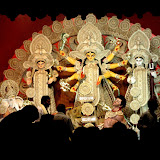Chennai, Tamil Nadu
1. The walls of the train are steel, and the bunks are blue plastic, a softish fake leather. In Third AC, each compartment as two sets of three bunks to a wall, facing each other, complimented by a set of two, shorter bunks on the side of the train. I was sitting with the thick scarred plastic of the window to my right, tweedish blue curtains pushed into the corner, and the set of two short bunks to my left, across the rolling-suitcase-width hallway. The middle bunks folds down during the day, and six (usually more) people squeeze onto the two benches created by the lowest birth. Dinner is around 7:30; families unpack tiffins (stainless steel tupper-ware) of lemon rice and home-made chutneys, while single men traveling on business and young women going for visas at the American Embassy in Chennai munch on deep-fried anything (wada, samosas, bananas). The young woman sitting across from us wore a tan kurta with black embroidery and black churdidar pants that bunch at the ankles. Her long, perfectly straight her fell down to her elbows as she expertly flipped through games and numbers in her cell. Her mother sat to her right, wrapped in a pinkish red saree decorated with identical, but slightly thicker, versions of her daughter's gold jewelry. We chatted with the young woman about
2. The Chennai office is at the back of a driveway in a residential neighborhood. It has lower ceilings than the office I’m accustomed to, and the walls are painted a very Indian light pink. The doorways are wide, and only sometimes hung with white wooden slats. From my desk in the very back room, I could see the documentation team working on a assortment of computers, a print-out from the Mr. Bean cartoon exclaiming something exceptionally British and somewhat entertaining next to a white board scrawled with a schedule in red pen. Just past one more slightly-dusty, somewhat-used gray metal cabinet, I could get one glimpse of the front room of the office, where the administrative assistant rules the roost and a thin segment of real live daylight makes it inside past the porch and the motorbikes parked outside and the decorated threshold and the pink archways and the accountant with her embroidered saree and long perfect braid hung with a string of jasmine that I could smell when the breeze was just right.
3. We invited a friend to Shabbat, and he taped it. On the video, our faces appear in a vague circle of sepia-toned light, tilted and moving just a little with the words. We are sitting on the floor – marble that has been swept clean but could use a loving mop – and leaning against undecorated, high white walls. The candles, storm candles that Shlayma remembered to grab on the way out of our
4. The dry sand of the beach is dirty, scattered with junk-food wrappers and dead fish, feces and broken pieces of fishing nets. The wet sand is empty, decorated only with the broken shell of a coconut being washed up and down the same two feet by the quiet but insistent waves. In the mid-day heat there are no boats out on the water, and only a few people venture out of the shadows. The peeling paint on the prow of a fishing boat – maybe twenty feet long, and open on top, meant to be propelled only by paddles and the waves – gives me just enough shade to peer out at the intensely blue sea. The sky is two shades lighter, but even without the green undertones and white flecks of the water, the dome above is just as bright as its twin sister. I hold up my hands, the dark brown lines of henna suddenly bright against my light skin, somehow separated from the rest of my body. They look solitary and strong, with the line of the horizon cutting across the back of my palms and so I hold them there and let the sun sink in, thick and penetrating and feel the breeze push back, strong and warm and embracing until it picks up my hair and tosses it in my face so my hands have to go back to work.
5. Anyone from Chennai will tell you that
... I’m sitting on the tiled floor of my co-worker’s home (concrete but tiny), 1.5 bus-hours south of Chennai, and a few hundred meters away from the polluted sand and sparkling water of the Bay of Bengal. I’m sparkling-ly clean from a warm bucket shower – although I almost accidentally bathed in seawater. The henna is fading from my palms, and my white button-down shirt makes me feel uncomfortably like an actress in some adventure travel film. Kenny Chesney is playing from my friend’s computer – I’m recovering from a strange sort of panic attack, and the smooth voice of emotional country pop rocks sounds just right. It was a wave of emotion, voices shouting and whining in my head, intuition on a loudspeaker, hands shaking as I took off small piles of shackle-bangles so I could curl up on my bed and mindlessly scan the same three headlines on The Hindu, not a tear or a scream or a word in sight – until, instantaneously and indescribably, the wave washed over me and turned the volume down, so that the same sentences scrolled behind my open eyes with without a trace of flashing neon colors. And the world was alright, and I was curled up on a hard mattress with an orange sheet in a un-lived-in apartment in one tiny, insignificantly random corner of it...




No comments:
Post a Comment